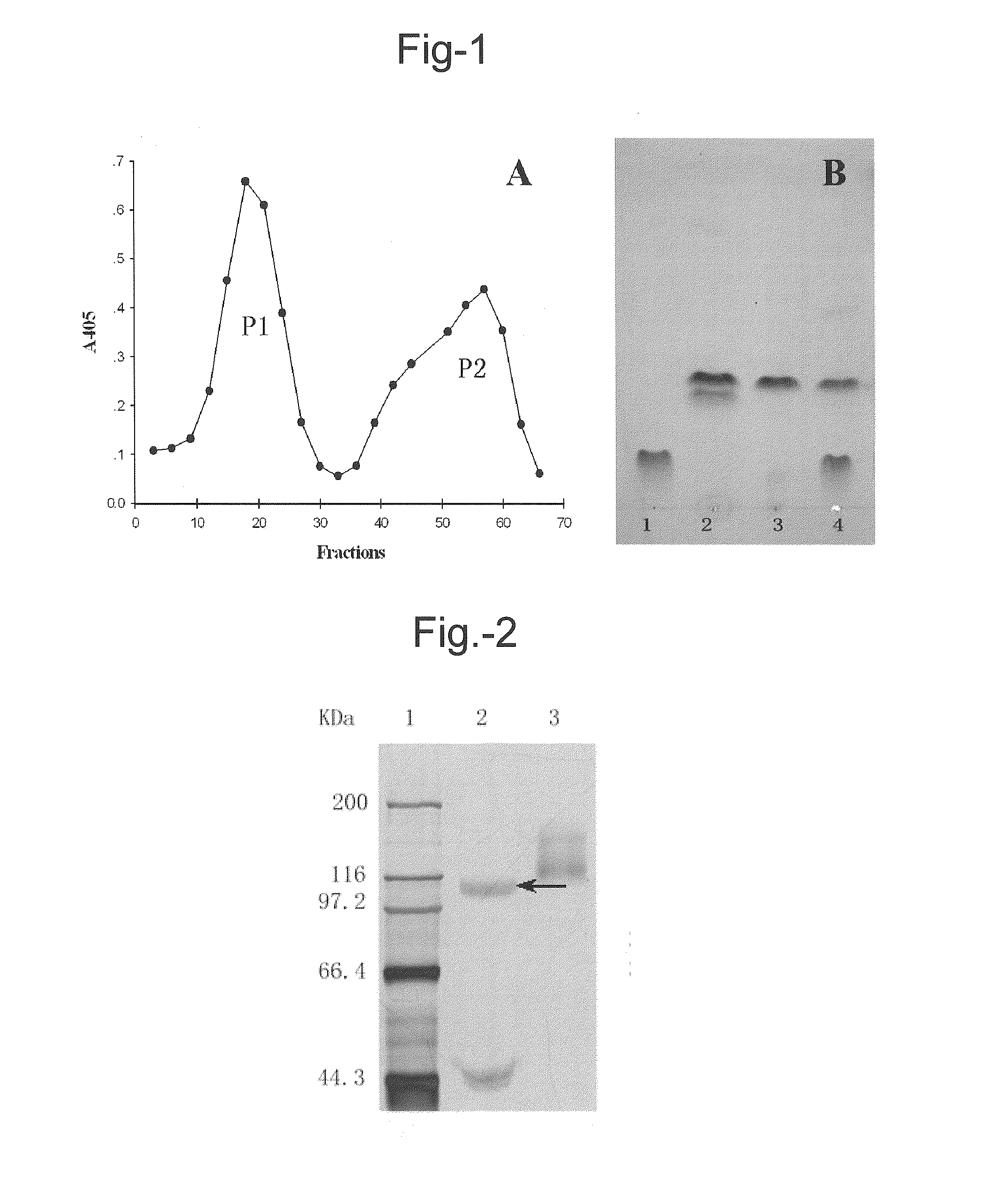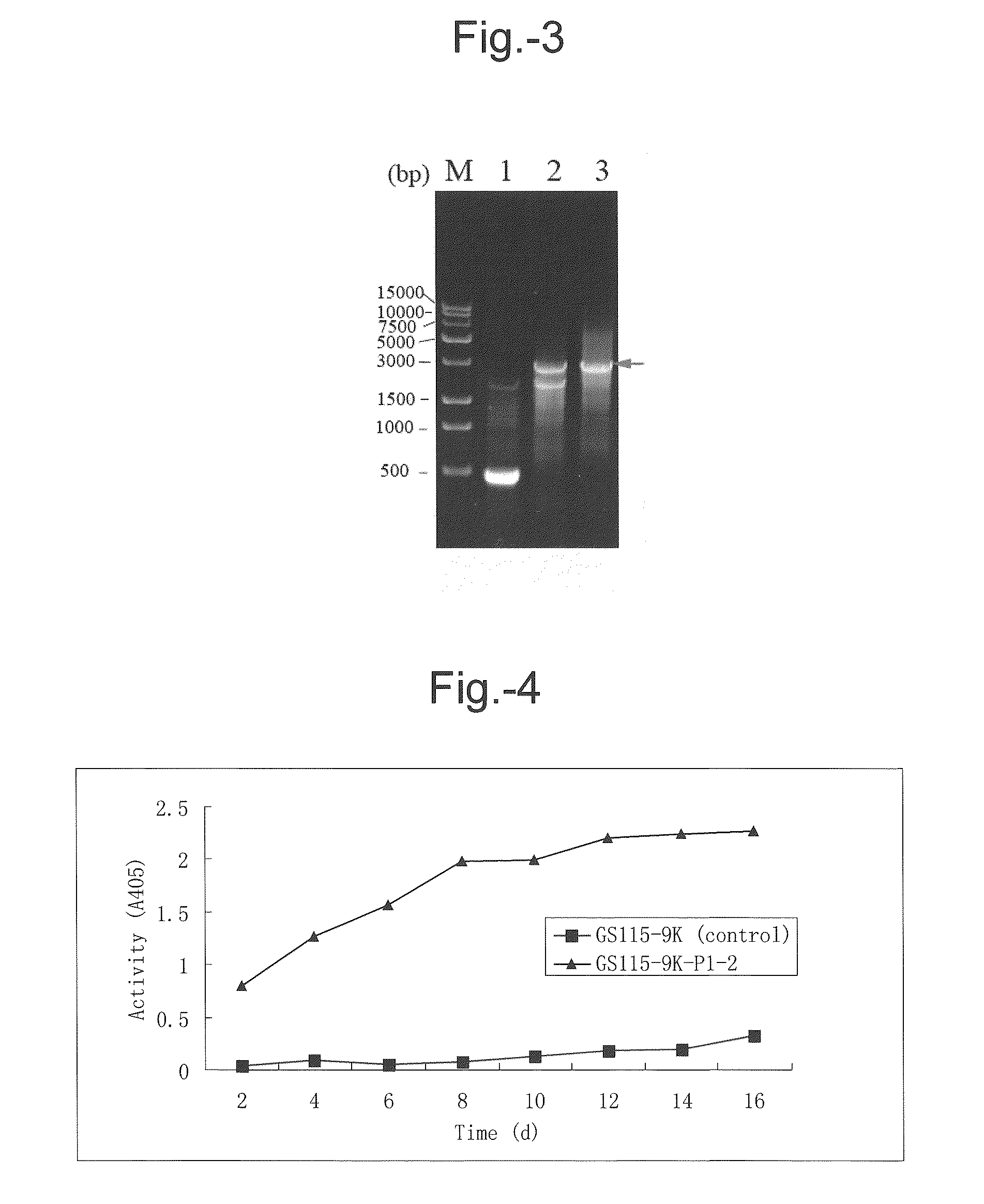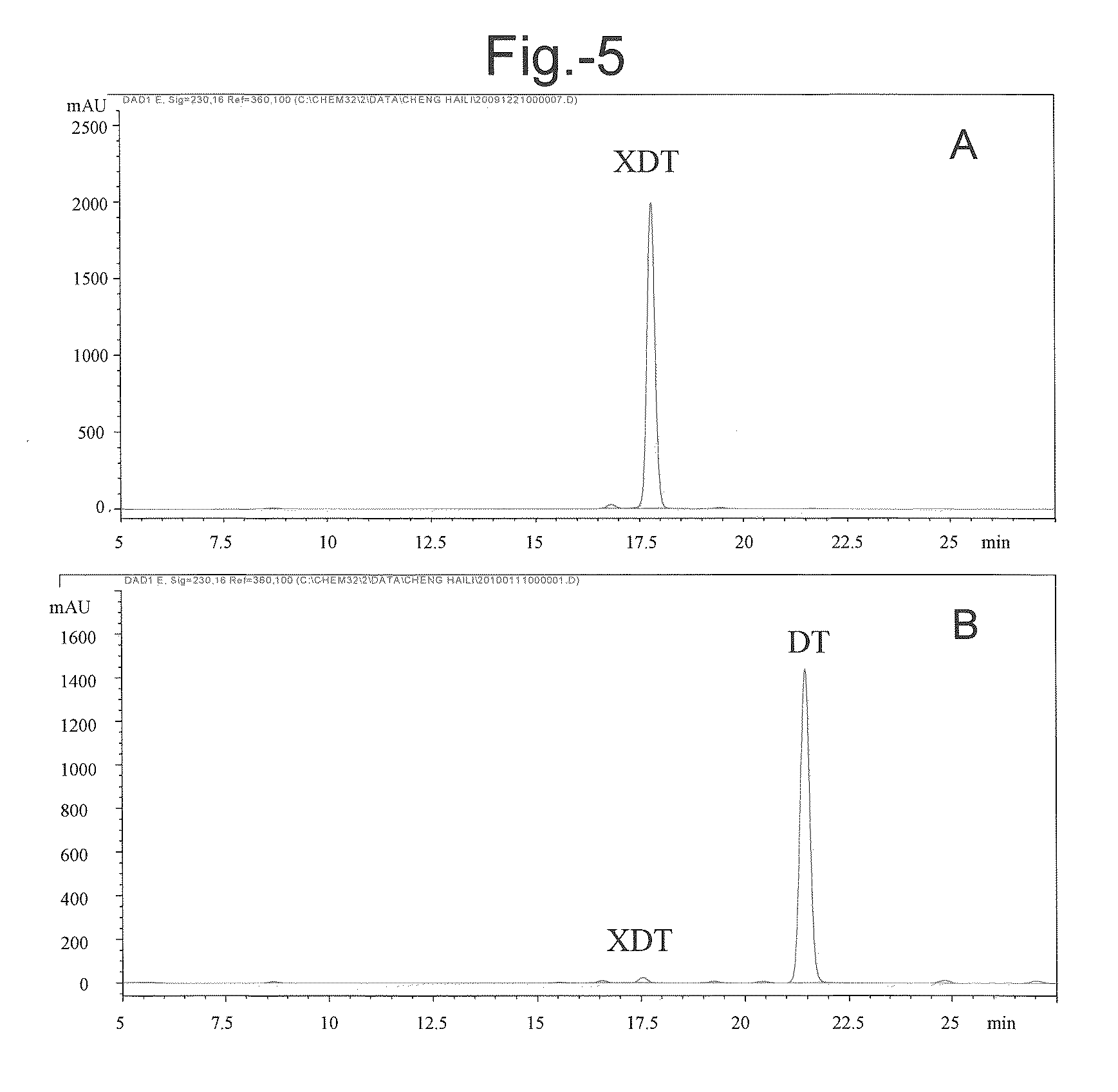Glycosyl hydrolase with beta-xylosidase and beta-glucosidase activities and uses thereof
a glycosyl hydrolase and betaxylosidase technology, applied in the field of novel effects, can solve the problems of complex reaction process and environmental pollution, low yield, and insufficient yield to meet the requirements of industrial mass production, and achieve novel effects, novel and effective, and improve the properties of animal feed
- Summary
- Abstract
- Description
- Claims
- Application Information
AI Technical Summary
Benefits of technology
Problems solved by technology
Method used
Image
Examples
example 1
Purification of L. edodes β-xylosidase-β-glucosidase (LXYL-P1)
[0098]Cultivation of the fungus M95.33. About 1 cm2 of lawn picked from a mycelial slant after cultivation was inoculated and grown in 100 ml sterile wheat bran liquid medium [contains per liter: 50.00 g wheat bran (added with appropriate amount of water, boiled for 30 min and then filtrated to quit the solid residue), 20.00 g peptone, 1.50 g KH2PO4, 0.75 g MgSO4, natural pH˜6.3] for 6˜8 days at 25˜26° C. and 160 rpm in an orbital shaker.
[0099]Isolation, Purification and Analysis on the Glycosyl Hydrolase. The mycelium was harvested by filtration. After grinding with liquid nitrogen, 3˜5 volumes of 50 mM Tris-HCl cell lysis buffer (pH 8.0) was added and then the resultant was subjected to ultrasonic treatment for 5 min on ice (130 W, 10 seconds each time with a 10-second interval). The supernatant was collected after centrifugation (12000 rpm, 10 min), which was used as the crude enzyme solution for further isolation and ...
example 2
Specificity Test on Different Glycoside Substrates Hydrolysis by LXYL-P1 (or P1) Protein
[0111]In addition to the β-xylosidase activity, especially the activity of hydrolyzing 7-xylosyltaxanes, the specificity of the LXYL-P1 (or P1) on other glycoside substrates was also tested by employing four chromogenic substrates: p-nitrophenyl-β-D-glucopyranoside (PNP-Glc), p-nitrophenyl-β-D-galactopyranoside (PNP-Gal), p-nitrophenyl-α-L-arabinopyrano side (PNP-Ara), and p-Nitrophenyl-β-D-xylopyranoside (PNP-Xyl, serving as a control). Each of the chromogenic substrates was prepared in 50 mM acetate buffer to obtain 5 mM solution (pH 5.0).
[0112]To the purified P1 protein diluent (25 μl) obtained in example 1, 100 μl of each chromogenic substrate was added. The reaction was performed at 50° C. for 20 min and stopped with 2 ml saturated solution of sodium borate. Release of p-nitrophenol (absorbance value) was measured at 405 nm. The result showed that, P1 protein could hydrolyze PNP-Glc and PNP-...
example 3
Cloning of the Encoding Gene (Lxyl-p1) of the Glycosyl Hydrolase LXYL-P1
[0114]LXYL-P1 obtained in Example 1 was subjected to SDS-PAGE electrophoresis (see FIG. 2), and the electrophoretic band with an apparent molecular weight of about 110 kDa after reduction treatment was recovered and subjected to LC-MS / MS analysis. The five oligopeptides with the highest peaks were selected and subjected to De novo sequencing and the amino acid residue sequences of the five oligopeptides were obtained as follows:
[0115]
1.LPWTWGK(SEQ ID NO: 4)2.QSGSLPLQHPQR(SEQ ID NO: 5)3.HWLAYEQETSR(SEQ ID NO: 6)4.DLPVGDSAVVTYPPR(SEQ ID NO: 15)5.TLTPLEALQK(SEQ ID NO: 16)(Wherein I and L,K and Q are notdistinguishable)
[0116]Bioinformatic approaches were applied to assess the relative locations of the five oligopeptides, and the order thereof on LXYL-P1 was determined to be: 3, 2, 5, 1, 4. Forward and reverse degenerate primers were designed as follows respectively according to oligopeptides 3 and 5:
[0117]
3F1:CTTGCG...
PUM
| Property | Measurement | Unit |
|---|---|---|
| concentration | aaaaa | aaaaa |
| concentration | aaaaa | aaaaa |
| concentration | aaaaa | aaaaa |
Abstract
Description
Claims
Application Information
 Login to View More
Login to View More - R&D
- Intellectual Property
- Life Sciences
- Materials
- Tech Scout
- Unparalleled Data Quality
- Higher Quality Content
- 60% Fewer Hallucinations
Browse by: Latest US Patents, China's latest patents, Technical Efficacy Thesaurus, Application Domain, Technology Topic, Popular Technical Reports.
© 2025 PatSnap. All rights reserved.Legal|Privacy policy|Modern Slavery Act Transparency Statement|Sitemap|About US| Contact US: help@patsnap.com



